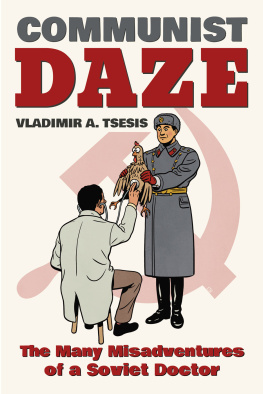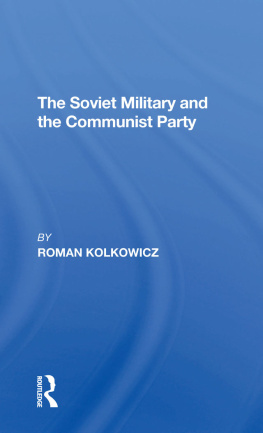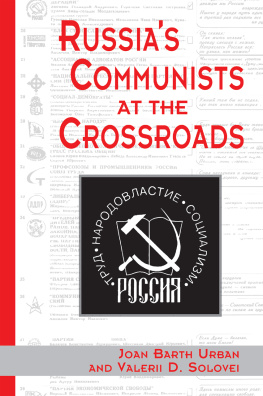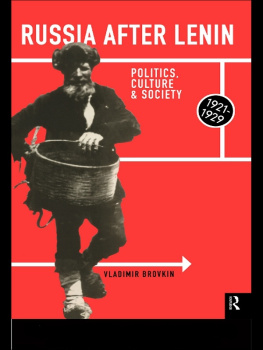
COMMUNIST
DAZE
COMMUNIST
DAZE
The Many Misadventures of a Soviet Doctor
VLADIMIR A. TSESIS
INDIANA UNIVERSITY PRESS
This book is a publication of
INDIANA UNIVERSITY PRESS
Office of Scholarly Publishing
Herman B Wells Library 350
1320 East 10th Street
Bloomington, Indiana 47405 USA
iupress.indiana.edu
2017 by Vladimir A. Tsesis
All rights reserved
No part of this book may be reproduced or utilized in any form or by any means, electronic or mechanical, including photocopying and recording, or by any information storage and retrieval system, without permission in writing from the publisher. The Association of American University Presses Resolution on Permissions constitutes the only exception to this prohibition.
The paper used in this publication meets the minimum requirements of the American National Standard for Information SciencesPermanence of Paper for Printed Library Materials, ANSI Z39.481992.
Manufactured in the United States of America
Library of Congress Cataloging-in-Publication Data
Names: Tsesis, Vladimir A., author.
Title: Communist daze : the many misadventures of a soviet doctor / Vladimir A. Tsesis.
Description: Bloomington, Indiana : Indiana University Press, [2017]
Identifiers: LCCN 2016050900 (print) | LCCN 2016052661 (ebook) | ISBN 9780253025944 (cloth : alk. paper) | ISBN 9780253025869 (pbk. : alk. paper) | ISBN 9780253025890 (e-book)
Subjects: LCSH: Tsesis, Vladimir A.Health. | PediatriciansSoviet UnionBiography. | PediatriciansUnited StatesBiography.
Classification: LCC RJ43.T754 A3 2017 (print) | LCC RJ43.T754 (ebook) | DDC 618.9200092 [B]dc23
LC record available at https://lccn.loc.gov/2016050900
1 2 3 4 5 22 21 20 19 18 17
Dedicated to victims of the Soviet public health system.
Contents
Preface

September 1964
Its a bright summer morning in glorious Soviet Moldova. Once again, I find myself racing across dully colored hospital grounds in pursuit of a decidedly earnest, righteously dedicated Communist who also happens to be my new boss. Lyubov Evgenyevna Oprya, specialist in obstetrics and gynecology, is the Gradieshti Rural Medical District Hospitals chief doctor. Though dressed in a doctors uniform of white gown and cap, she resembles a typical rural village dweller. Lyubov Evgenyevna cannot be called beautifulshort, practically without a neck, and sporting sharp gray eyes, a low forehead, and a large, round, moonlike face with weathered skin carrying the unmistakable scars of adolescent acne. The fat on her body is remarkably uniformly distributed, which, in combination with the absence of a neck, gives her the unfortunate appearance of a rapidly walking meatball.
Lyubov Evgenyevna is a no-nonsense but personable woman known for her fierce, unswerving belief in the Communist Party and an unabashedly uncomplicated approach to life. The fresh-out-of-school young doctor trying to keep pace with her is, I must confess, quite different.
On that summer morning, as we march forthright across the grounds, Maria Tuliu, the hospitals chef, stands at the door of her kitchen, waving. Known for her borscht, or beet soup, and portions of butter, eggs, or meat when she can get them, Maria is young and tall, and she always seems happy. Today, her smile is not diminished by the dullness of her attire: a peasant shawl, simple country clothes, and a battered, once-white apron.
Her wave reminds my boss of something important, and she doesnt hesitate to act.
Good morning, Maria! shouts Lyubov Evgenyevna without breaking stride, voice booming throughout the yard and deafening, I bet, more than the handful of people now scurrying away from us. Nice to see you! All your blood tests look absolutely normal, except the Wassermann test! The rules require all hospital employeesincluding those in the hospital kitchento have periodic checkups, which include the Wassermann reaction test, a blood test for syphilis that often gives a false positive result.
What is that Wassermann test for? yells Maria back, still smiling.
Its for syphilis! The test shows you probably have syphilis!
Whats that? What did you say? shouts Maria, leaning forward, now a bit puzzled. What do I have?
SYPHILIS! YOU MIGHT HAVE SYPHILIS, MARIA!!! screams Lyubov Evgenyevna at the top of her voice. The scattering crowd moves hastily.
Maria bursts out laughing, having no idea what syphilis is and not realizing her reputation has just been publically besmirched by her bossand physician. But then again, none of the remaining handful of stragglers on the grounds seem to understand, either.
Horrified, I glance at my boss, whos looking down at her clipboard and already moving to the next item on the days order of business. Marias delighted chuckling follows us into the outpatient clinics, where wait, as always, leathery-skin peasants and their dehydrated children from the surrounding countryside.
Welcome to three years in strange and wonderful Gradieshti. Welcome to medicine, good ole Soviet style.
Acknowledgments

First, I am most grateful to my wonderful wife, Marina, who is always my best friend, precious adviser, and inspiration.
By a stroke of destiny, I was privileged to meet Gary Dunham, my publisher and editor at Indiana University Press, who found in my bookto my sheer luckexactly what I wanted to express. In him, I encountered a kindred soul in perception of reality. His personal work on the manuscript is beyond any praise and description. I am very grateful to him for his friendship and unfailing optimism.
I am deeply indebted to Laura De Santo Wagner who did an excellent job as an editor of the manuscript before it was submitted to the publisher.
COMMUNIST
DAZE
A listener asks Armenian Radio whether the Soviet Union would ever surpass the United States economically.
Armenian Radio replies, No comrades, the Soviet Union cannot surpass America because the entire world might notice the holes in our pants.
Beginnings

L ets call it, Gradieshti, shall we? An elliptical riot of twisting, unnamed, muddy alleys and streets caught between hills swarming with brush, the rural village could be found, if one looked long enough, about ten miles from Tiraspol in the Moldavian Soviet Republic (today the Pridnestrovian Moldovan Republic). When I stepped off a dilapidated bus on August 1, 1964, Gradieshti was home to some five thousand souls and an assortment of chickens, ducks, goats, sheep, pigs, cats, and dogs, including a most agreeable three-legged mutt whom we will meet in a while. Stepping over a stray dog lying sprawled and still in the heat, I set on the ground two small pieces of luggageone filled with medical books, of course. Taking a deep breath, I looked around at my new home.
A huge Communist propaganda poster, faded by time and weather, gazed down on me. Welcoming me to Gradieshti was a large, radiantly smiling peasant woman with hands raised wide and dressed in Moldovan folk costume. Seemingly endless wheat fields rolled into the distance behind her. The bottom of the poster proudly proclaimed, GLORY TO THE HANDS THAT SMELL OF BREAD.
Rolling my eyes, I took a few steps, squinting in the bright sunshine and hoping for a glimpse of the real Moldovan village where I had been sent to serve and practice.
Next page












